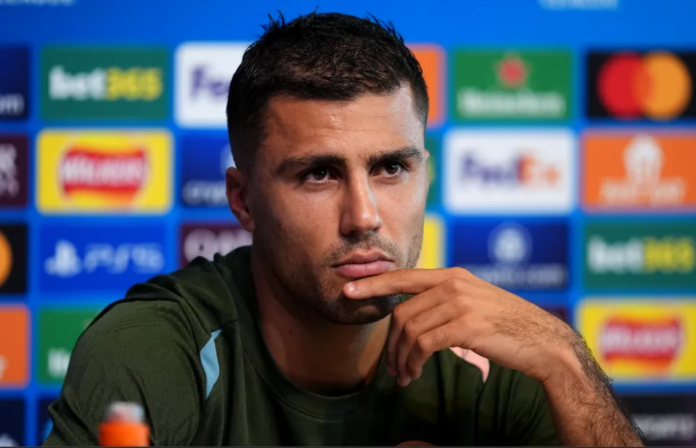Manchester City midfielder Rodri says players are close to going on strike in protest at an increase in games.
City face Inter Milan on Wednesday in the Champions League, with a new format adding at least two extra games before the knockout stage.
The Club World Cup – which Pep Guardiola’s side are also involved in – has also expanded to 32 teams and will be held next summer.
“I think we are close to that,” said Rodri when asked whether players will strike.
“It’s easy to understand something general, you ask any player, he will say the same.
“If it keeps this way, it will be a moment that we have no other option, but let’s see.”
The new Champions League and Club World Cup formats mean City will play at least four extra matches compared to last season’s guaranteed fixtures.
They played just two games to win the Club World Cup in December, but next summer would need to play three group games and four knockout matches if they were to go all the way.
Across the past two full seasons, City played 120 times across all competitions.
Fifpro – the union for the top European league and global players – recently described legal action against Fifa for its increased game schedule as “inevitable”, something the Professional Footballers’ Association (PFA) backed.
Spain midfielder Rodri featured 63 times for club and country last season, on the way to winning the Premier League and European Championship within the space of two months.
He missed City’s first three matches of the season and returned for their 2-1 win over Brentford over Saturday, six days after playing for Spain in their 4-1 win over Switzerland in the Uefa Nations League.
After such a long 2023-24 season – which started competitively on August 6, 2023 and ended 343 days later, on 14 July – Rodri said he needed a longer break than he was initially given.
“It was great for my legs, great for me, I had one month and I [still] needed to recover a bit – so two months to stop a bit and prepare myself,” Rodri explained.
“It is even more important nowadays. It helps me a lot. When they start pre-season I watch them but try to disconnect, and the mental health – in that sense – is important, to refresh and move on.”
Players and managers speaking out
Rodri’s comments come less than 24 hours after Liverpool goalkeeper Alisson spoke out against the changes in schedule.
City defender Manuel Akanji recently suggested that because of the increased schedule, he would have to retire when he is 30 due to the lack of breaks during the season.
And Real Madrid manager Carlo Ancelotti said that the club are considering giving their players holidays during the season in order to combat the increase in fixtures.
Fifpro and PFA among those to take action
In July, Fifpro said it would take legal action against Fifa over its “abuse of dominance” in football.
Fifpro’s statement read: “Fifa’s decisions over the last years have repeatedly favoured its own competitions and commercial interests, neglected its responsibilities as a governing body, and harmed the economic interests of national leagues and the welfare of players.
“Legal action is now the only responsible step for European leagues and player unions to protect football, its ecosystem and its workforce.”
Those sentiments are echoed by the PFA who, in May, said players were at breaking point.
“Legal action is the unfortunate but inevitable consequence of major stakeholders within the game – the leagues and the players – being ignored,” said chief executive Maheta Molango.
“As always, it’s the players who are expected to bend. As we have seen, eventually they will break. It has to stop.”
How likely is a player’s strike?
Rodri has suggested a player’s strike could be “close” but, in reality, will one actually take place?
A spokesperson from the PFA has suggested that, should players not be listened to, they will “begin to consider all options available to them”.
“In recent weeks our members have made their feelings very clear when it comes to the fixture calendar and player workload.
“Players are repeatedly saying that enough is enough, and this must now act as a serious wake-up call to the authorities.”
Speaking last week on the schedule, La Liga president Javier Tebas said that while the schedule has increased for players, not enough are effected by the changes to warrant such backlash.
“We always think of 150 or 200 players who play all the games. But in Europe, there are more than 50,000 players who don’t play all those games and don’t have the problem of the match load,” Tebas told BBC Sport.
“Football cannot be governed by what happens to 250 players, but by the rest because, in addition, all these new tournaments would economically empty the national leagues and impact the salaries of other players with fewer club revenues.”
While there is little precedent for players striking in elite sport, in 1961, Jimmy Hill campaigned for the end to the maximum wage cap for footballers. After threatening strike action, the then £20-a-week maximum wage was scrapped by the Football Association.

